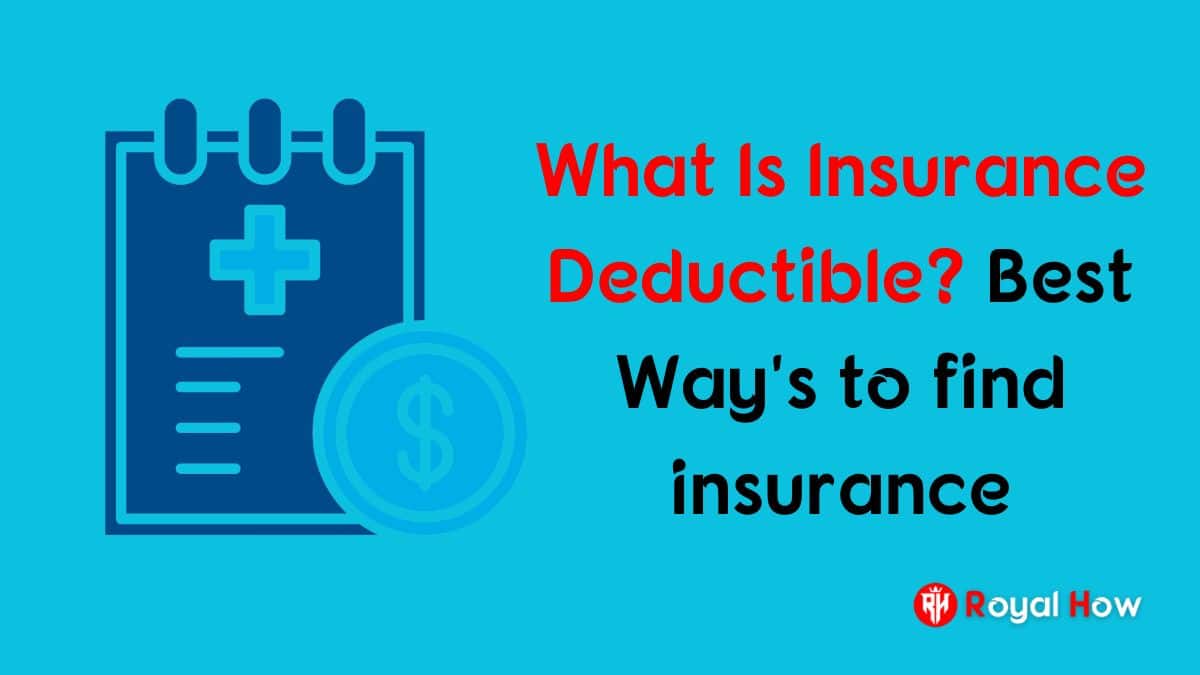Understanding insurance can be a complex task, especially when it comes to the term “insurance deductible.” In this article, we will break down the concept of insurance deductibles, shedding light on what they are, how they work, and their importance in your insurance policy. By the end, you’ll be equipped with valuable knowledge to make informed decisions about your insurance coverage.

Insurance Deductible
An insurance deductible is the amount of money you, as the policyholder, are responsible for paying before your insurance company starts covering expenses in the event of a claim. It serves as a form of cost-sharing between you and your insurer. Let’s delve deeper into this concept and explore various aspects related to insurance deductibles.
Different Types of Deductibles
Insurance deductibles come in various forms. Understanding these types can help you choose the right insurance policy for your needs. Different types of insurance have different typical deductible ranges. For example, auto insurance deductibles are often in the hundreds of dollars, while health insurance deductibles can vary widely, from a few hundred dollars to several thousand.
1. Standard Deductible
In this type, you pay a fixed amount out of pocket before your insurance kicks in. For example, if you have a $500 standard deductible on your auto insurance and incur $2,000 in damages in an accident, you’ll pay the first $500, and the insurer covers the remaining $1,500.
2. Percentage-Based Deductible
Instead of a fixed amount, a percentage of the total claim cost is used as the deductible. For instance, if you have a 10% deductible on your health insurance and face a $5,000 medical bill, you’ll be responsible for $500, while your insurer covers the remaining $4,500.
3. Annual Deductible
With an annual deductible, you pay a set amount each year before your insurer covers any expenses. This is common in health insurance policies. Your personal financial situation and risk tolerance play a significant role in determining your deductible. If you have a robust emergency fund and can comfortably cover a higher deductible in the event of a claim, you might choose a higher deductible to save on premiums.
4. Split Deductible
Some insurance policies have a split deductible, where different deductibles apply to different types of claims. For instance, a homeowners insurance policy might have one deductible for wind damage and another for theft. Ensure you have an emergency fund set aside that can cover your deductible in case of an unexpected event. This will prevent financial strain when making a claim.
Benefits of Having an Insurance Deductible
Having an insurance deductible in your policy offers several advantages:
1. Lower Premiums
Policies with higher deductibles typically come with lower monthly premiums. This allows you to save money on insurance costs in the long run. There’s an inverse relationship between deductibles and premiums. If you opt for a higher deductible, your monthly premiums will be lower. Conversely, a lower deductible typically means higher monthly premiums.
2. Encourages Responsible Behavior
Deductibles encourage policyholders to be cautious and avoid making small, frequent claims. This can help maintain a stable insurance premium over time. Taking preventive measures can help you avoid claims altogether. Safe driving practices can reduce the chances of auto accidents, and maintaining a healthy lifestyle can lower health-related claims.
3. Flexibility in Coverage
You can often choose the deductible amount that suits your financial situation and risk tolerance, giving you control over your policy. Think about your insurance needs not just for the short term but also for the long term. While a higher deductible may save you money now, consider how it may impact you in the event of a major claim down the road.
Must Read:-
- Compare Vehicle Insurance for the Best Coverage for 2023
- Property Insurance: Best way’s to Safeguarding Your Investments in 2023
- Business Insurance in Australia: Best Way,s to Comprehensive Guide in 2023
FAQs
Q1: Are insurance deductibles the same for all types of insurance?
A: No, insurance deductibles vary depending on the type of insurance policy you have. Each type of insurance—auto, health, home, etc.—has its deductible structure.
Q2: Can I change my deductible amount?
A: In many cases, you can adjust your deductible when renewing your policy. However, it’s essential to understand how changes might affect your premiums and coverage.
Q3: What’s the relationship between deductibles and coverage limits?
A: Deductibles and coverage limits are interconnected. Lower deductibles often come with higher premiums and vice versa. It’s crucial to strike a balance that suits your budget and needs.
Q4: Do deductibles apply to all types of claims?
A: Not necessarily. Some insurance policies exempt certain claims or offer special deductibles for specific situations, like natural disasters.
Q5: Can I have a zero-dollar deductible?
A: Some insurance policies offer zero-dollar deductibles, but they typically come with higher premiums. You’ll need to weigh the cost against the benefit.
Conclusion
Insurance deductibles are a crucial component of various insurance policies. They help determine the cost-sharing between you and your insurer. By understanding the types of deductibles and their benefits, you can make informed choices when selecting insurance coverage. Remember to review your policy carefully and consult with your insurance provider to ensure you have the right deductible for your needs.
Understanding the factors that influence deductible amounts and how to make the most of your deductible can empower you to make informed decisions about your insurance coverage. By dispelling common misconceptions, you can navigate the world of insurance with confidence and ensure that your policy aligns with your financial goals and needs.
Remember that discussing your insurance options with a qualified insurance agent or advisor is essential to finding the right balance between premiums and deductibles for your unique situation.
